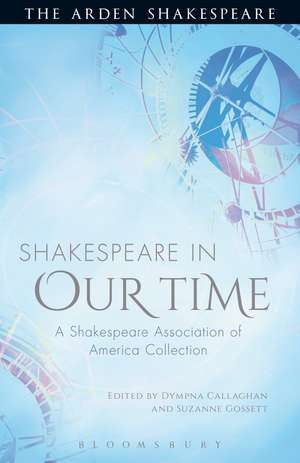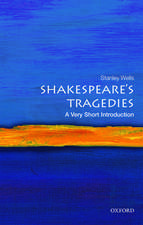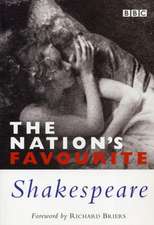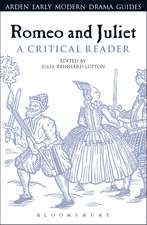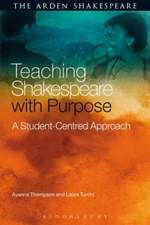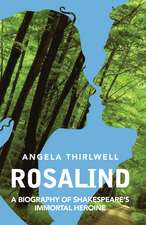Shakespeare in Our Time: A Shakespeare Association of America Collection
Prof. Dympna Callaghan, Prof. Suzanne Gossetten Limba Engleză Paperback – 23 mar 2016
| Toate formatele și edițiile | Preț | Express |
|---|---|---|
| Paperback (1) | 168.15 lei 6-8 săpt. | |
| Bloomsbury Publishing – 23 mar 2016 | 168.15 lei 6-8 săpt. | |
| Hardback (1) | 599.50 lei 6-8 săpt. | |
| Bloomsbury Publishing – 23 mar 2016 | 599.50 lei 6-8 săpt. |
Preț: 168.15 lei
Preț vechi: 204.91 lei
-18% Nou
Puncte Express: 252
Preț estimativ în valută:
32.18€ • 34.94$ • 27.03£
32.18€ • 34.94$ • 27.03£
Carte tipărită la comandă
Livrare economică 22 aprilie-06 mai
Preluare comenzi: 021 569.72.76
Specificații
ISBN-13: 9781472520418
ISBN-10: 1472520416
Pagini: 372
Dimensiuni: 140 x 216 x 15 mm
Greutate: 0.45 kg
Editura: Bloomsbury Publishing
Colecția The Arden Shakespeare
Locul publicării:London, United Kingdom
ISBN-10: 1472520416
Pagini: 372
Dimensiuni: 140 x 216 x 15 mm
Greutate: 0.45 kg
Editura: Bloomsbury Publishing
Colecția The Arden Shakespeare
Locul publicării:London, United Kingdom
Caracteristici
Offers an overview of Shakespeare studies covering all key areas of study and research
Notă biografică
Dympna Callaghan is William L. Safire Professor of Modern Letters at Syracuse University, USA. Suzanne Gossett is Emeritus Professor of Literature at Loyola University, Chicago, USA.
Cuprins
Preface - Lena OrlinList of ContributorsIntroduction - Dympna Callaghan and Suzanne GossettFeminismWhy Feminism Still Matters - Phyllis RackinJust Imagine - Kathryn SchwarzLetters, Characters, Roots - Wendy WallSexualityDeeds, Desire, Delight - Bruce R. SmithRethinking Sexual Acts and Identities - Mario DiGangiHexaSexuality - Madhavi MenonTeachingThe Classroom - David BevingtonMoney for Jam - Marjorie GarberExtension Work - Patricia CahillEditingFacts, Theories, and Beliefs - Barbara A. MowatWhat We Owe to Editors - Lukas ErneWhat's Next in Editing Shakespeare - Sonia MassaiMortalitySuicide as Profit or Loss - Mary Beth RoseDeath and King Lear - Michael NeillShakespeare's Here - Scott L. NewstokMediaSpectatorship, Remediation, and One Hundred Years of Hamlet - James C. BulmanPerforming Shakespeare through Social Media - Pascale AebischerReading Shakespeare through Media Archaeology - Alan GaleyRace and ClassIs Black so Base a Hue? - Jean E. HowardThe Race of Shakespeare's Mind - Lara BovilskySpeaking of Race - Ian SmithSourcesShakespeare and the Bible - Robert S. MiolaShakespeare's Sources - Ania LoombaVolver, or Coming Back - Sarah BeckwithText and AuthorshipCollaboration 2016 - Gary TaylorThe Value of Stage Directions - Laurie MaguireThe Author Being Dead - Adam G. HooksGlobalizationAgainst Our Own Ignorance - Susanne L. WoffordCircumnavigation, Shakespeare, and the Origins of Globalization - Daniel VitkusThe Bard in Calcutta, India, 1835-2014 - Jyotsna G. SinghBodies and EmotionsBodies without Borders in Lear and Macbeth - Gail Kern PasterPotions, Passion, and Fairy Knowledge in A Midsummer Night's Dream - Mary Floyd-WilsonShakespeare and Variant Embodiment - David Houston WoodSocial ContextSocial Contexting - Frances E. Dolan"Hic et ubique": Hamlet in Sync - Bradin BormackPlaying in Context, Playing out Context - William N. WestHistoricismHistoricizing Historicism - William C. CarrollMinding Anachronism - Margreta de GraziaThe Historicist as Gamer - Gina BloomAppropriationsAmerican Appropriation through the Centuries - Georgianna ZieglerAppropriation 2.0 - Christy DesmetAppropriation in Contemporary Fiction - Andrew HartleyBiographyShakespeare and Biography - Peter HollandShakespeare's Friends and Family in the Archives - David KathmanBiography vs. Novel - Lois PotterClassicismThe Classics as Popular Discourse - Coppelia KahnShakespeare's Classicism, Redux - Lynn EnterlineTime, Verisimilitude, and the Counter-Classical Ovid - Heather JamesPublic ShakespeareThe Publicity of the Look - Paul YachninPublic Women / Women of Valor - Julia Reinhard LuptonThe Ghost of the Public University - Henry S. TurnerStyleWilliam Shakespeare, Elizabethan Stylist - Russ McDonaldNondramatic Style - Stephen Guy-BrayShakespeare's Lexical Style - Alysia KolentsisPerformancePluralizing Performance - Diana E. HendersonThe Study of Historical Performance - Tiffany SternShakespeare / Performance - W. B. WorthenEcocriticismShakespeare and Nature - Rebecca BushnellShakespeare without Nature - Steve MentzThe Chicken and the Egg - Karen RaberAfterword: Shakespeare in Tehran - Stephen Greenblatt
Recenzii
Shakespeare in Our Time is an invaluable source in presenting illuminating and intriguing approaches to Shakespeare's plays. In its twenty articles it is ultimately a challenging conversation among distinguished scholars of the early modern period. The chapters raise interesting and innovative concerns, such as American appropriation, social context, Shakespeare's sources, and text, and cover a wide range of critical approaches from feminism to ecocriticism, from sexuality to morality, from media to race and class systems, and from historicism to globalization. Each section includes three or four articles from various critical approaches that both broaden the reader's understanding and approach the matter with new perspectives . Shakespeare in Our Time enriches and broadens the understanding of students and instructors with clear guidance of Shakespeare studies. All chapters, but particularly chapters on teaching, editing, and biography, are informative and beneficial for pedagogical interests. In each chapter, authors present interesting, innovative, and challenging approaches to help students understand their world by learning from Shakespeare's language, characters, and messages. The book provides professors, students, and readers with eye-opening analyses that will help extend their horizons.
